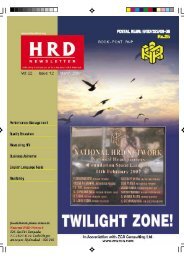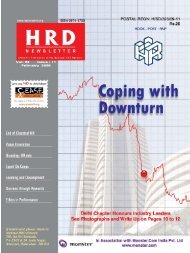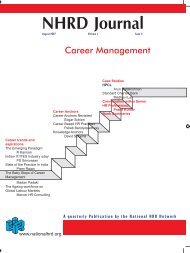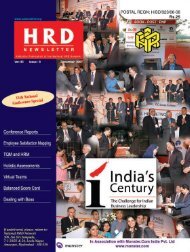NHRD Journal - National HRD Network
NHRD Journal - National HRD Network
NHRD Journal - National HRD Network
You also want an ePaper? Increase the reach of your titles
YUMPU automatically turns print PDFs into web optimized ePapers that Google loves.
and gives the freedom to fail.<br />
Change in Ongoing Businesses<br />
It is important to ensure that once the direction<br />
is chosen the new business is structured to<br />
provide focus and accountability. ITC chose<br />
to go into hotels as a business several years<br />
ago. They provided focus to the fledging<br />
business and accountability by creating a<br />
distinct organization and leadership with<br />
focus and accountability. The business has<br />
now grown into a very profitable division.<br />
Focus, leadership and accountability can help<br />
even existing business that require<br />
rejuvenation and/or meet tough competition.<br />
When Nirma was actively eroding Hindustan<br />
Lever's market share in the early eighties it<br />
chose to fight the battle in the field on the sales<br />
front. The company put three of its best young<br />
managers on the sales side. They turned the<br />
tide and two of them went on to become<br />
chairman of the company later. Both ITC and<br />
HLL examples suggest the importance of<br />
leadership when changing direction in existing<br />
business or perking it up.<br />
Choosing a Wrong Direction<br />
An Indian company that had been doing very<br />
well in manufacturing technology based<br />
commodities of good quality decided to change<br />
its strategy and change to branding the same<br />
and recruit FMCG managers to bring in the<br />
change. While it is true that Intel and Gujarat<br />
Ambuja cement have been successful in<br />
branding their commodity, there are more<br />
examples of people who have failed. In the case<br />
of this company the market did not accept this<br />
change. Its problem got compounded by the<br />
fact that the newly inducted expensive<br />
managers could not adjust to the underlying<br />
technology of the products and from a profitable<br />
business it slid to a loss. It has now changed<br />
direction and is on its way back to health.<br />
Multinational companies operating in India<br />
at times benefit from changes of direction<br />
initiated abroad after a lot of research and<br />
debate. But they are also at the wrong end of<br />
receiving the stick in India when the change of<br />
direction initiated abroad does not jive with<br />
realities in India. For instance, Unilever's<br />
decision to hive off the chemical business and<br />
focus on ice creams may be consistent with the<br />
parents view of its 'core business' but may not<br />
be in sync with local realities.<br />
When People Are Affected<br />
One of the most difficult areas of implementing<br />
directional change is when it affects existing<br />
people with long service adversely. Recently, a<br />
large engineering company invited consultants<br />
to do a job evaluation of all managers. They<br />
had several hundred managers whose jobs had<br />
to be evaluated and this evaluation would affect<br />
several thousand others. This company did not<br />
have a good performance evaluation system<br />
and managers were promoted on a time bound<br />
basis to a higher level even if they continued in<br />
the same job. The consultants warned the<br />
management that a proper job evaluation will<br />
result in many jobs going down as their exalted<br />
status is only due to the fact that the incumbent<br />
has got into a higher grade in spite of doing the<br />
same job. The management in an aggressive<br />
mode agreed as they felt they needed a system.<br />
By the time the project was getting over the top<br />
management received several messages from<br />
people who feared their jobs might go down.<br />
In the end the company backtracked and very<br />
little of the consultants work was implemented.<br />
I suspect in this case the company decided to<br />
go ahead with the job evaluation project and<br />
fantasized about its will to be tough.<br />
Conclusion<br />
To conclude, management of change requires<br />
the choice of direction and then the<br />
management of various processes to support<br />
the directional change. Successful companies<br />
debate the direction, provide focus through<br />
organizational arrangements and leadership<br />
and then manage the processes.<br />
November 2007 <strong>N<strong>HRD</strong></strong> <strong>Journal</strong> 77
















